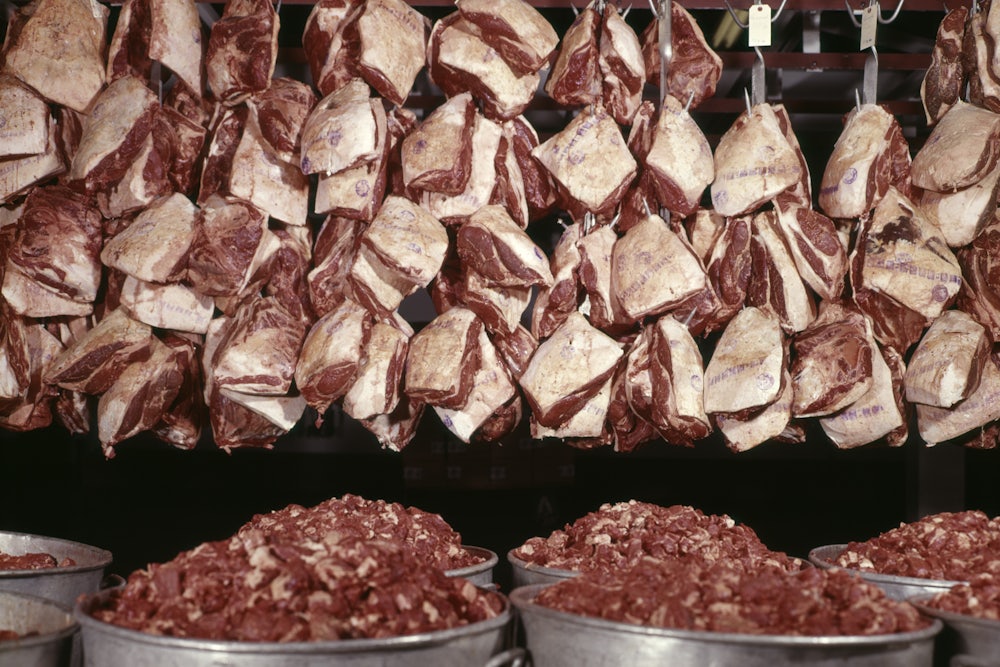“‘Eat bugs, live in a pod,’ is not a meme. It’s their real agenda,” tweeted the conservative provocateur Mike Cernovich to 1.1 million followers last month. The tweet was responding to an anodyne Economist story about the role of meat consumption in global climate emissions. And unless you’re deep into online culture, it’s probably incomprehensible.
Cernovich was referring to a theory increasingly beloved by the right’s keyboard culture warriors—that a shady cabal of elite globalists is conspiring to make everyone on earth eat bugs instead of burgers. Why elite globalists would choose this particular plot is unclear; of all the so-called “alternative proteins” that have been suggested as replacements for meat in the American diet, insects are both the option that is already most widely eaten around the world and the one least likely to replace mainstays like pork, chicken, and beef among affluent global north consumers. If replacing BBQ brisket with roach bricks were part of the secret globalist agenda, it would surely rank somewhere way down the list of feasibility after eliminating electoral democracy, implanting everyone with microchips, and replacing football with fútbol—all changes less likely to raise consensus opposition than pissing off American meat-eaters.
The obsession with bugs, though, perfectly encapsulates the insipid but dangerous battlefield that meat now represents in America’s perpetual culture war. From right-wing trolls’ disparaging references to effeminate left-wing “soy-boys,” to the stomach-churning embrace of hypermasculine “carnivore” diets, it’s clear conservatives’ darker fantasies aren’t just about threats to a dietary staple but about threats to the liberty, bodily integrity, and masculinity of American men.
Echoes of these extreme visions are increasingly bubbling into policy debates, including more “establishment” conservative responses to global climate change. Actual members of Congress now customarily accuse any policy that might reduce meat consumption, and some policies that simply touch on greenhouse emissions, of ripping meat from Americans’ jaws.
Because this is all so ridiculous, it’s easy to miss the tragedy: Turning meat into a culture-war issue both creates new, tribal ideals of consumption and undermines the political and systemic change needed to create a healthier and more sustainable food system—one where more Americans could afford to eat well, where waterways didn’t get poisoned by runoff, where superbugs aren’t bred in feedlots, and where food workers aren’t routinely exploited and maimed. Despite culture warriors’ iconoclastic and anti-elite posturing, the biggest beneficiaries of the meat culture war are the incumbent business and political interests that already play an outsize role in setting the menu of the American diet. Among the biggest losers are ordinary consumers.
Meat holds a special place in our national mythology, conjuring the frontier, the cowboy, and the ranch; real Americans eat red meat, and real American men grill it. Red meat is so central to this mythos that (imagined) threats to it are sometimes construed as totalitarian threats to fundamental liberty. And while it’s true that vegans and vegetarians tend to skew left and Democrats tend to claim to want to reduce meat consumption more than Republicans, the raw fact is that at least 90 percent of Americans eat meat and two-thirds agree that “eating red meat is part of the American way of life,” making carnivory a decidedly bipartisan affair.
Nonetheless, red meat has so far mostly been used by Republicans as a cudgel to bash Democratic climate initiatives, which Donald Trump, a notorious fan of burgers himself, warned would result in a ban on cows. Increasingly, Republican politicians use the love of red meat as a general symbol of conservatism. That’s why Ryan Zinke branded a calf ahead of his run for a Montana House seat, posting the photo with the caption “Let’s Go Branding!” in a not-so-subtle nod to the far right’s rallying cry of “Let’s Go Brandon!” It’s why Iowa Senator Joni Ernst proposed banning “Meatless Mondays” and why Nebraska Governor Pete Ricketts went a step further in declaring a “Meat on the Menu” day (we suspect most Nebraskans did not need this encouragement). Across the board, the GOP has positioned itself as the political and cultural champion of meat eating, rebuffing all recent efforts to curb the consumption of meat, to price it equitably, or even to shut down slaughterhouses as the first wave of Covid-19 infection swept through them. People once wondered whether an openly gay Republican could ever win major office; today the better question is whether an openly vegan Republican could.
Let’s Go Branding! pic.twitter.com/R0Iaiw6EoE
— Ryan Zinke (@RyanZinke) May 21, 2022
Yet the case for reducing meat production and consumption grows by the day. It would cut back on excessive land and water use, zoonotic illness, pollution, and greenhouse gas emissions. That’s not to mention the benefit to animal welfare. As reports from the United Nations and a growing number of publications in leading scientific journals suggest—and as the Economist article pilloried by Cernovich reported—shifting away from meat, and especially beef, especially in high-consuming countries, would go a long way in reducing the ecological hoofprint of our food system. Here, Republican obstruction is not helpful, least of all to Republican-voting constituencies. Consider the Colorado River, which runs through red states as it does blue states, and which has dropped to historic lows due not just to drought but also to its use in irrigating feed crops like alfalfa fed to cattle. In fact, in terms of its contribution to despoiling ground and drinking water, animal agriculture is immediately most harmful to the very rural constituencies that often elect conservative politicians. And of course, the effects of climate change don’t discriminate based on political allegiance.
But as international organizations, including the World Economic Forum, wake up to the growing body of evidence and start calling for dietary changes, the backlash has increased—disproportionately. For the right’s most strident culture warriors, meat is not simply a food; it’s a critical front in an existential conflict.
The fundamental premise of a culture-war framing is that an existing material problem must be seen as a surrogate for a larger clash between two (and only two) irreconcilable views of the world held by two irreconcilable groups of people. Us versus them, elites versus the people, woke versus MAGA, globalists versus purebloods. Think here of the Covid mRNA vaccines that, once doused in culture-war accelerant and set ablaze, quickly went from being the signature accomplishment of the Trump administration’s Warp Speed program to being instead a symbol to many conservatives of an ominous globalist agenda and government overreach.
The role of the culture warrior is to establish new fronts within this symbolic struggle. In the process, the fault lines of identity and emotional attachment the culture war depends upon deepen. Because the larger struggle is itself vague and irresolvable, this mode of engagement is less about practically addressing the instigating problem than about signaling to adherents how they should feel about the problem’s stubborn irresolution; how it should shore up their opposition to whatever the other side is doing. Culture-war framings are intended not just to polarize but to separate the audience from any material analysis of the problem at hand and the means of fixing it.
Culture-war framings, accordingly, tend to wildly amplify and distort real, less sensational messages. “We should eat less meat” is real. “The elites are going to make cows illegal” is not. Statements of fact become ominous threats. Entreaties become vindictive arm-twists. Take Cernovich’s tweet. No one is trying to force anyone in the United States to eat bugs. It’s not clear anyone even wants to try—although some people have certainly argued in a theoretical sense that bugs might be more sustainable. A very small number of companies might be trying to sell Americans cricket flour, but most commercial uses projected for insect meal are actually as livestock feed.
But in the culture war, feelings don’t care about your facts. What matters is framing the issue around a clear divide between an in-group (red-blooded, red-meat-eating, red-voting Americans) and an out-group (liberal, cosmopolitan, effete, transnational, technocratic elites forcing you to eat crickets). And this, in turn, sends an explicit message about how to align personal behavior with your ideological grievances: Eat meat to own the libs, the globalists, or whoever.
All this bile, hyperbole, and conspiracy theorizing has an actual, material effect: to reinforce a status quo dominated by unaccountable global multinational corporations. Under the guise of empowering average people to eat “real” meat, the meat culture war winds up reinforcing precisely the players that are pumping the nuggets full of exotic additives, all the while celebrating common and conventional dietary choices as some sort of edgy iconoclasm. “I’m going to eat meat, like 95 percent of my countrymen, both Democrat and Republican, in the country that already eats the most meat per capita in the world, most of it produced and processed by huge agribusiness conglomerates, because I am a rebellious, independent freethinker who rejects globalist dogma and control,” is not a coherent statement. But when you ratchet up the combative victimhood narrative, somehow this position takes on a life of its own.
Propelled to popularity by Canadian self-help guru Jordan Peterson and a slew of online influencers like the now-disgraced Liver King, whose dietary staples included bull testicles and steroids, carnivore diets promise to make men masculine again. The political is personal here, with feelings of imperiled bodily autonomy and vigor interweaving dietary, political, and gender identity. Carnivore diet enthusiasts pack their plates with as much animal protein, fat, and entrails as they can stomach and avoid eating anything else in an effort to increase masculine vigor by overdosing on protein. In this, the carnivore diet is like an exaggerated version of other faddish low-carb diets such as Atkins and keto, but it takes on additional emotional intensity because its advocates, often with diet books and products to hawk, have cleverly imbued it with culture-war significance. The dinner plate and stomach microbiome are treated as the last redoubt of resistance to anything that would impinge on consumer self-determination. The culture warrior’s carnivore diet is a shopping movement for dudes, a Goop for the GOP, wherein the masculine, right-wing self is defined by its purchases. As Gwyneth Paltrow long ago realized, insecurity and just-so stories sell; the most entrepreneurial culture warriors seem to have embraced the Goop model and repackaged it to the alt-right manosphere set. Cernovich, for example, is a part-owner of the dietary supplement company Gorilla Mind. Alex Jones, the Infowars host who peddles the “soy boy” taunt, also does a brisk business in supplements and skin care products.
But this can quickly degenerate into the basis for a far more radical agenda. In the dungeons of the online right, meat consumption overlaps with far more explicitly far-right and ethnonationalist politics. Consider Raw Egg Nationalist, an anonymous bestselling author featured in Tucker Carlson’s 2022 film, The End of Men, who links the consumption of animal products with a back-to-the-land nationalism meant to strengthen the West and its traditional moral values against, among other things, immigration and feminism. The enemy here is “soy globalism,” a concern shared with another anonymous author, the bodybuilding enthusiast and “anti-xenoestrogen” crusader who goes by the pseudonym Bronze Age Pervert. BAP, as his young, right-wing devotees refer to him, peddles pseudo-Nietzschean lost masculinity myths and meat-centric dietary advice to the extreme right, referring to the woke masses as “bugmen.” Both Raw Egg Nationalist and Bronze Age Pervert appeared last fall in a report by the Global Network on Extremism and Technology, the academic research arm of the Global Internet Forum to Counter Terrorism. The danger, the report’s authors suggested, was that the mainstreaming of right-wing racial “gastropolitics,” when linked with conspiracy theories about post-Covid food supply sabotage by globalist elites, “may present the potential for violent consequences.”
That these provocateurs are going mainstream is no longer in doubt: Aside from Raw Egg Nationalist’s appearance in The End of Men, Bronze Age Pervert’s book got a sympathetic review by former Bush speechwriter and Trump national security official Michael Anton in the Claremont Review of Books. (He noted, tellingly, that it might be strategically understood as appealing to conservative youth.) And the ideas of the meat-right are reproduced almost indistinguishably in the American Conservative, where Itxu Diaz opines that:
I don’t know anyone who wants to leave their children a world where you can only get around by bicycle or, at best, electric cars, where heating is banned, and at lunchtime you find a salad with crickets, worms, and fake steaks by Bill Gates waiting for you on your plate. That is not a world, that is hell. For centuries, much of the superiority of Western civilization has been apparent in our food. There is no need to give our moral decline a seat at the dinner table.
From here it’s only a short hop to Marjorie Taylor Greene’s conspiratorial pronouncements against “fake meat” being grown in “peach tree dishes.” While liberals sneered at Greene’s malapropism, the episode can only portend an even greater unwillingness of elected conservative lawmakers—of the sort who brand cattle for good P.R.—to take environmental and agricultural policy seriously. It also makes such policy ever more difficult to discuss or put on the agenda, as the specter of far-right critique can never be far from the minds of GOP lawmakers or even Democrats in conservative and agricultural constituencies.
Culture warriors may itch to fight about diets precisely because they would otherwise have a losing hand. Letting the Colorado River run dry to own the libs, stated plainly, is not a very appealing proposition for anyone, left or right. And digging in your heels on meat eating in a country where meat eating is a rare space of bipartisan agreement is hardly a provocative position. But outlandish and extreme behavior, like committing to only eating meat or making up boogeyman stories about bug-peddling billionaires, attracts both radical followers and angry recriminations from their opponents on the left, which, in turn, helps them launder what would be otherwise unpopular policies into the conservative mainstream. Attacks on “lab meat” and “soy boys” may also pull people with legitimate concerns about food safety into a right-wing orbit. Profoundly personal as it is, diet acts as a sturdy bridge for the traffic among national identity, masculinity, and bodily purity.
That’s the essence of the right’s culture-war metabolism: It transforms the energy of grievance into the substance of reactionary policy. The culture warriors win not when the war is over (it can never end) but when they scuttle any possibility of solving actual problems. They and their political allies frequently seem to want to destroy the capacity of the state to regulate the food supply with fairness, safety, and sustainability in mind. Ironically, it is this very absence of government regulation that produces a nightmarish outcome not far from the conspiracy theorist’s vision of mandatory bug bricks: a dystopia in which most food comes from a handful of shady megacorporations that sell chemical-laden flesh of mysterious provenance. Scary? It already exists. It’s what they sell in the meat case in every grocery store in America.








